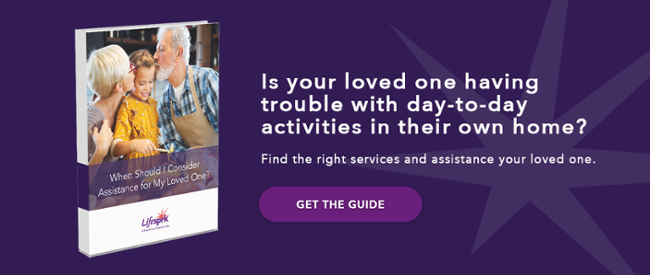Time to talk about that ‘one fall’ with your elderly parents. The fall you may or may not know about. If you’re like most adult children then you can relate to how your aging parents have a funny way of not sharing all the details of their care at home. They say it was ‘just this one time’ or ‘I’m fine, it was a little fall.’ But here you are in the emergency room just to be sure. The scary facts – every 11 seconds an older adult is in the emergency room for a fall and every 19 minutes, a senior dies from a fall. Those are real statistics from the National Council on Aging. Those ‘little’ falls end up resulting in more than 2.8 million injuries treated in the ER for seniors.
Do you often hear yourself saying things like “I am worried about Dad falling,” or “Is it normal that Mom steadies herself by holding onto furniture when she walks into a room?” Or maybe you’ve heard her say: “This medicine I’m taking sometimes makes me feel light-headed” or “I’m more tired than usual.” These are ‘red flags’ as we identify them at Lifesprk and potential risks for falling if ignored.
The good news? These falls can be prevented and more often than not there are simple things you can do to be proactive to safeguard your parent’s independence. And help you sleep a little better each night.
It starts with honest conversations. I heard someone say today, ‘don’t avoid the conversation or emotion – go right through it.’ This is kind of like that. There’s no good time to bring it up but if these fears are eating at you, there’s a good chance they are with your aging parents, too. Be gentle and straightforward. Your parents value their vitality and one little fall tends to scare seniors because they fear another one or having their independence taken away. Let them know, this is not one of those conversations – this is about being proactive versus reactive – and you are ready to listen to help them maintain their independence at home.
Lifesprk Life Care Managers (LCMs), who are all nurses, know what it takes to keep people safe wherever they call home. It is such an integrated aspect of the home care services they provide, that they do it daily often without our clients even knowing. While falls may never be 100% eliminated, they’ve helped thousands of Minneapolis seniors stay in control and what’s better, living ‘sparked lives’ – that’s what it’s really about.
Here a few strategies they’ve used with senior care clients and families that provide a good start with fall prevention for your aging loved one:
- Medications – Take inventory of all prescription, over-the-counter medications and supplements, then make a list to share with your mom’s doctor. When multiple doctors are involved in one person’s care it’s easy to get confused on when/how to take prescribed medications, or if there are interactions that might make your parent dizzy or weak. One key in preventing falls: get help managing medications. This is a service Lifesprk LCMs provide, but you may also get it from a pharmacist. The key is having a professional who knows all the medications and supplements your mom is taking and has access to.
- Have they fallen before? A pattern of recent falls is an indication of the need for additional support. Ask about falls and write down the details of any that have occurred and when they happened to uncover any patterns. Create an environment where your parents feel comfortable talking about falls and other issues, so you’ll know about any fall.
- Get physical – Lifesprk LCMs encourage proactive strength building to help prevent falls. Connect to resources that can help now (even if your parents haven’t experienced a fall) with exercise, strength, or balancing programs. Check with the local senior center, exercise club, or health center on a senior campus to find professionals who specialize in exercises for seniors. Physical and/or occupational therapists can also help in the home immediately after a fall has occurred to help seniors regain strength and avoid future falls, and those services may be covered by insurance like Medicare.
- The right accessory – shoes! Something as simple as changing shoes can have a dramatic impact on falls. The wrong kind of shoes may cause them to slip, stick to the floor, or hurt their ankles – all contributing to a potential fall.
- Home safety check – As part of their in-home care service, Lifesprk LCMs regularly perform home safety checks for clients. Our LCMs encourage people to ask any in-home providers before hiring them (see the free download ‘In Home Provider Checklist’ for more suggested questions) about how often they perform a home safety evaluation. Completing one only at the beginning of care isn’t’ enough. Your in-home care provider needs to continually reevaluate your loved one’s home to maintain safety for the long-term, especially after any changes in conditions or medications. Things like poor lighting, cords, stair treads, rugs, or mats are easy fixes to prevent a potentially devastating fall.
The best way to prevent falls is to help your aging parents get proactive with their health or get back on track if they’ve experienced a fall. Sometimes involving a professional extra set of eyes early on to check on them once a week or even less, can alleviate a lot of worry for seniors, and you too. The goal is proactive planning so they can continue to live sparked lives.
Need help or guidance? Give us a call 24/7 and we can help. What concerns you? Have you experienced any of these situations? Share with us what worked for you so others can learn from your experience.



